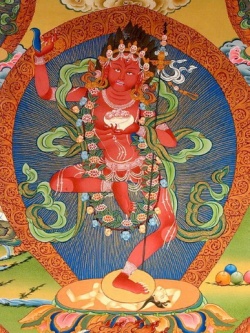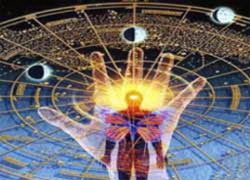Fear, Anger & Superiority
We began our discussion of Vajra Wisdom with the quality of Clarity. Because of this Clarity and attachment or resistance to it, certain neuroses end up developing. Karma plays a role in the creation and maintenance of these neuroses, because, each time we express these energies in a neurotic way, the tendency to express things in that particular way increases.
The first type of neurosis that comes from Clear Seeing is Fear. Fear is like alertness gone crazy. It starts out with the recognition of a potentially negative consequence from current circumstances. The desire for a positive result and aversion to the possible negative result increases as the negative result comes closer to becoming real. In order to avoid a negative result, the negative causes and conditions need to be counteracted. By ignoring this message, our alertness is not dealt with and so, the signal gets stronger. By being attached to the desire to avoid the negative result and, at the same time, ignoring the need to counteract the negative conditions, this strong sense of alertness becomes Fear. The longer the delay between the alertness and the action to resolve the message behind the alertness, the more the Fear strengthens. This is how Ignorance and Attachment lead to Fear.
Part of the problem with Fear, as well, is determining the real chances of a negative result. A good example of this is fear of flying. More people are killed in cars each year than on planes, and yet some people are very afraid of flying and not afraid of getting into a car. This is the result of our recognizing a possible negative result and then not analyzing further to determine the real chances that these bad things will happen. We react first and ask questions later, instead of the other way around.
Some of it relates to our fear of survival or our fear of losing our current status or posessions. This indicates an underlying recognition that our lives, status, and posessions are temporary. The problem comes from not having a larger view of the world beyond our small selves. As long as we are trying to hold on to and solidify aspects of ourselves that are impermanent, we will always be under the influence of fear and longing. Our Fear is the result of seeing clearly impermanence, but not looking more closely to see what exists beyond impermanence and recognizing the causes and conditions that are in play. This type of outlook is what the Buddha was talking about when he talked of the need to replace our Incomplete View with Complete View.
The Complete View is to recognize that, even though there is the loss of the temporary parts of our world including our lives, status, and posessions, there is a continuation into the future based on results from the present. Everything becomes a continual process of change and, if we take more control of the causes and conditions, it can become a process of improvement and development.
Another neurosis that can arise from Clarity is a sense of Superiority. Recognition of our own ability to see clearly, and another person's inability to see in the same way, can cause us to exaggerate this difference and then think of ourselves as better than they are. We develop an impatience with those who can't see what we see, in the way that we see it. The result is that we can view and treat these people with disrespect because, in our mindsy are no longer our equals or are no longer deserving of the same type of treatment. Harming them or exploiting them becomes possible because we feel justified in such actions.
This sense of Superiority can also result from our recognition of our ability to analyze and organize better. We can also become proud of our ability to build and work with details. Our ability to see and our focus on differences can tempt us to see ourselves as superior and the differences in others as inferior. Instead of just feeling good about our abilities, we develop this notion of separateness between ourselves and others based on focussing on the differences in our qualities or talents. This can also result in intolerance and impatience towards those who do not share our abilities or characteristics.
The greatest neurosis involved in Vajra family energy is Anger. This is because anger involves strong expressions of energy directed against our past, present or future reality. Anger comes from viewing the world as solid and unchangeable. Because of this viewpoint, the only solution to our problems when overcome by Anger becomes retaliation and destruction. Because destruction is ultimately impossible (because of the true nature of reality), then anger and actions done out of anger only breed more frustration.
Anger comes from seeing our goals, values, and desires and then seeing the obstacles in our way. This comes from the Vajra energy of analysis and organization. We can see the steps needed to take, the components required, and how it all fits together. Our longing and attachment to those desires, and the way that we have decided is the best way to accomplish these desires, is so strong that we deny or ignore the need for creating the causes and conditions necessary to eliminate our obstacles. We have somehow developed the notion that we should never have obstacles to the things that we desire, even though, time after time, we are shown that this is rarely the case. Again Anger comes from learning and believing in an incomplete view of how reality works.
Another major difficulty related to the Form aspect of Vajra energy is how we deal with ourselves and our world. We are tempted to view things or try to force things to be either eternally existent, or completely non-existent. We tend to want to view parts of our world as absolutely critical or not at all important instead of somewhere in the middle. We think that this should happen based solely on our desires. Because of this, when we experience aspects of the outer world, which includes our own bodies, we usually relate to it by way of grasping, resisting, or ignoring. We tend to look at things as solid and ever-lasting. We also tend to think of everything as existing independently so we tend to think that it's impossible for things to change. Anything that we don't want, we hope that it becomes totally non-existent and we end up feeling that we have to destroy it, because, in our mindss cannot change any other way.
We start with longing for certain ideas, or for certain external forms or circumstances, or longing to attain certain qualities (strong muscles, or a slender waist, or wealth for instance). We can then experience the frustration that comes from longing for these things and not obtaining them as quickly or easily as we think we should. Once we have actually attained these desired forms or circumstances (a new house or car, a respected social position), then we develop attachment to these forms and have to work hard to keep them and resist any signs that they might disappear. Because of this preoccupation of struggling against impermanence, they take on a un-proportionately large place in our life and mind.
The result is that we lose perspective and no longer see these ideas, forms, or circumstances in relation to other parts of ourselves or the rest of our world. A lot of our time ends up being spent caring for and protecting these objects or circumstances that we have acquired or place value in. An example is the work-aholic who becomes so focussed on their job, that they neglect their families and miss important stages in their children's development. Sometimes we react to protect an idea, or situation before really examining if the new idea or circumstance might be better than the one that we're holding on to. Frustration, Fear and Anger can result when contemplating the difficulty involved in protecting our favourite objects or ideas. Fear and anger can also arise from worrying about or being frustrated by missed opportunities as a result of our pre-occupation with protecting our forms or circumstances. It ends up being a vicious cycle.
On top of this, our own ideas and acquired forms become extremely important to us and we tend to dismiss or ignore the ideas and forms of others. The result is that we can tend to defend our thoughts and forms against perceived loss or threats in relation to those of others. This is another way that attachment can lead to fear and anger. We can also tend to feel superior in our own thoughts, forms and circumstances and very critical of the thoughts, forms, and circumstances of others. We often use this critique of the possessions and qualities of others to protect and reinforce our own sense of superiority.
When we meet with ideas, external objects, or situations that we find negative and wish to avoid or eliminate, then this leads to fear and anger as well. We try to wish or think these negative ideas and situations out of existence. We find creating the proper causes and conditions too slow a process or too difficult to counteract the negative causes and conditions and so we try to force the situation. This is how we end up creating anger out of an urge to speed up the elimination of a negative circumstance.
Also, most of the time, we fail to recognize that we view these ideas and situations as negative because of the goals and priorities that we have set. We don't even consider the possibility that perhaps our goals and priorities need adjusting. We don't realize that we are just being shown what we need to work through if we really want the goals that we think we do. We also usually don't take into consideration that others do not necessarily have the same goals and priorities that we do. The result is anger in defense of a perceived threat or obstacle or fear of an unwanted result.
When we react out of anger, we retaliate against any threats. Our aim becomes destruction and elimination. We are like a porcupine, putting out all of its quills at everything around us. We lose sight of our interdependence with others and we lose sight of the interconnections in the world around us. We end up blasting through without any regard for these interdependencies and interconnections. The result of ignoring these is that we create all sorts of suffering and future difficulties in the process.
When we are overwhelmed by the details of thoughts or the intricacies of forms, we react by shutting down. Usually we react by dismissing everything and reacting as if nothing is important. This is the classical nihilistic response to reality. Because we are so overwhelmed by our focus on the negative parts of our world, we become depressed and pessimistic. We have lost the ability to see the other aspects of our world or see our world from a more positive point of view and so it has become bleak, dark, cold, and without life.
As with any of the emotional disturbances, each time we react to a situation with impatience, frustration, or anger, the likelihood that we will react in the same way to a similar situation becomes stronger. It becomes a learned response which arises more and more automatically. With each angry reaction, we create more and more problems because we've been ignoring interdependence in order to force our way. Dealing with these ever increasing problems and threats, which have really resulted from our own actions, makes us more and more frustrated and angry, until our whole world is engulfed in problems, difficulties, threats, and obstacles, and our mind becomes constantly filled with our reactions of frustration, anger, and aggression. Is this not similar to the descriptions of the Hell Realms?
In the same way, we can end up in a state of continual fear. With each fearful reaction to a situation (a spider or snake for instance), our fear is strengthened. Each time a fear is strengthened, it makes it more difficult to counteract and overcome that fear. We end up shying away from and avoiding all sorts of circumstances. In the worst cases, we can end up completely isolated and shut off from most or all of the rest of the world. This is exactly the description of the cold hells in the Buddha's teachings.
Superiority is also reinforced by continual repetition. This ends up isolating us further and further from others, who we deem are beneath us and far from being our equals. We end up associating with others who feel superior in the same way we do and yet we can never trust them, because, in our own mindsn they are inferior to us. Eventually others will ignore us, avoid us, and dismiss anything we say. If we are in a position of power over others and posess this superior attitude, we can end up performing all sorts of atrocities and harm. We will then have to eventually deal with the harmful habits and results of such atrocities.
Continual Pessimism, if we do not contradict it, can easily become a permanent part of who we are. This comes from focussing only on the negative aspects of a situation, which is never the complete truth. There is the story of how some neighbours came up to a man whose son had fallen and broken his leg and said to him that he must be very upset. His only reply was "You never know". The next day the expedition he was going to be a part of all died in an avalanche. So "You never know" what good can come out of a seemingly negative situation. This is besides the fact that it is impossible for worldly situations to be completely negative or completely positive.
These are how Anger, Fear, Superiority, and Pessimism are generated out of Vajra energy. We need to recognize that Vajra energy is only one of 5 ways of relating to our world. In addition to the differences and negativities in our world, there are also the similarities and positives. In addition to what's lacking in a situation, there is also what is beneficial in a situation. There is also always a sense of returning to balance and wholeness. Until we operate with this understanding all of the time, we need to remind ourselves of it over and over again.
We also need to develop the skill to use Vajra energy when required and then be able to pull back to a more complete view of any situation. Vajra neuroses comes from being caught up by the energy or its objects and then being sucked into reacting out of attachment, aversion, and ignorance.




